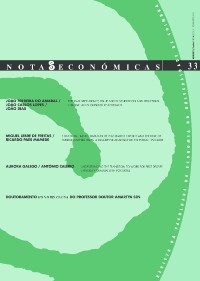Please use this identifier to cite or link to this item:
https://hdl.handle.net/10316.2/25224| DC Field | Value | Language |
|---|---|---|
| dc.contributor.author | Galego, Aurora | - |
| dc.contributor.author | Caleiro, António | - |
| dc.date.accessioned | 2013-07-17T10:25:18Z | |
| dc.date.accessioned | 2020-10-04T14:49:06Z | - |
| dc.date.available | 2013-07-17T10:25:18Z | |
| dc.date.available | 2020-10-04T14:49:06Z | - |
| dc.date.issued | 2011 | - |
| dc.identifier.issn | 2183-203X | - |
| dc.identifier.uri | https://hdl.handle.net/10316.2/25224 | - |
| dc.description.abstract | Uma forma tradicional de aferir a importância das universidades assume que estas são fontes de efeitos positivos do ponto de vista dos inputs. De acordo com esta perspectiva, a importância de uma universidade pode ser medida pelos seus efeitos multiplicadores, a nível regional/nacional. Esta perspectiva pode ser complementada através da análise das questões associadas à transição para o emprego pelos seus diplomados. O artigo analisa os factores que poderão ser importantes para explicar o tempo de obtenção do primeiro emprego por parte dos estudantes de primeiro ciclo, para tal utilizando uma amostra de alunos de uma instituição de ensino superior portuguesa, a Universidade de Évora. Assim, estimam-se diversas especificações de modelos de duração a tempo discreto. Os resultados mostram que existem diferenças significativas entre os estudantes dos diversos cursos e destacam a importância da classificação final do curso. No entanto, em particular, pode concluir-se que não existem diferenças significativas entre a área de Economia e Gestão e a área de Engenharia, e que estas áreas de estudo são as mais bem sucedidas na transição para o mercado de trabalho. Também não encontram diferenças significativas, neste aspecto, entre estudantes do sexo masculino e feminino. Conclui-se, igualmente, que existem diferenças significativas na probabilidade de saída do desemprego, entre os vários anos considerados na amostra, o que reflecte o ciclo económico. | por |
| dc.description.abstract | A traditional way of looking at the importance of universities assumes that these are sources of positive effects from the viewpoint of the inputs. In accordance to this perspective, the importance of a university can be measured by its regional/national multiplier effects. This perspective can be complemented with the analysis of the issues associated with the transition to work by their graduates. The paper thus analyses the factors that may be important to explain the time to obtain the first job by first degree students, using a sample of students from one university in Portugal. In doing so, we estimate several specifications of discrete-time duration models. The results show that there are significant differences among the students from the several courses and highlight the importance of the final mark in the course. Nevertheless, in particular, we conclude that there are no significant differences between the area of Economics and Management and the area of Engineering and that these study areas are the most successful ones. We also did not find any significant differences between male and female students. Finally, we also conclude that there are significant differences on the probability of leaving unemployment among the several years considered in the sample, which reflects the business cycle. | eng |
| dc.language.iso | eng | - |
| dc.publisher | Faculdade de Economia da Universidade de Coimbra | - |
| dc.title | Understanding the transition to work for first degree university graduates in Portugal | por |
| dc.type | article | - |
| uc.publication.collection | Notas Económicas nº 33 | - |
| uc.publication.firstPage | 44 | - |
| uc.publication.issue | 33 | - |
| uc.publication.lastPage | 61 | - |
| uc.publication.location | Coimbra | - |
| uc.publication.journalTitle | Notas Económicas | - |
| uc.publication.section | Artigos | - |
| uc.publication.orderno | 3 | - |
| uc.publication.area | Ciências Sociais | - |
| uc.publication.manifest | https://dl.uc.pt/json/iiif/10316.2/25224/267039/manifest?manifest=/json/iiif/10316.2/25224/267039/manifest | - |
| uc.publication.thumbnail | https://dl.uc.pt/retrieve/12123860 | - |
| item.grantfulltext | open | - |
| item.fulltext | With Fulltext | - |
| Appears in Collections: | Notas Económicas | |
Files in This Item:
| File | Description | Size | Format | |
|---|---|---|---|---|
| notaseconomicas33_artigo3.pdf | 730.81 kB | Adobe PDF |  |
Items in DSpace are protected by copyright, with all rights reserved, unless otherwise indicated.
